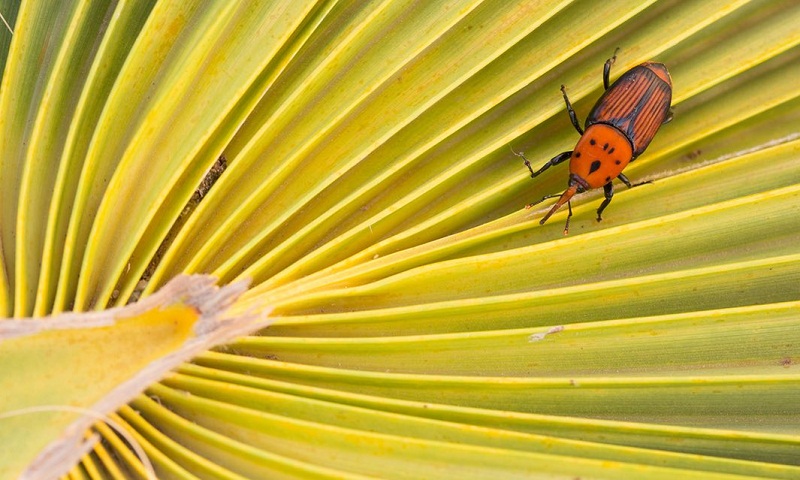Panic over the red devils threatening to strip Tunisia of its grand palm trees

A red palm weevil infestation is decimating trees and posing a threat to the country’s date crop, a mainstay of the fragile economy. It’s an unlikely but very real crisis for a country with a teetering economy: a tiny red devil is invading Tunisia and it could cost hundreds of thousands of people their livelihoods. Morched Garbouj, president of a Tunisian environmental group, smiled as he told the popular legend of how the red palm weevil first arrived in Tunisia. “Some people say that it was the former dictator Ben Ali’s son-in-law who brought it here. He was known for bringing in exotic animals, exotic trees, that kind of thing.” He points to the fact that the area suffering the greatest devastation is in Carthage, around the presidential palace. “Well, maybe it’s true!” The timing would fit. As the country was in the throes of revolution during the turbulent months of December 2010 and January 2011, the grand palm trees lining the boulevards of the upmarket suburb of Carthage began to die. From there, the infestation spread. Six years later – and despite what successive governments have claimed to be their best efforts – the infestation continues to spread, decimating palm trees in the north and gradually encroaching upon the vital crops in the south where lives depend on dates. Tunisia leads the world in date exports. According to the ministry of agriculture, there are 5.4 million palm trees within the country and, while not all contribute to the $231m (£179m) that dates generate in exports annually, all are at risk from the spread of the weevil. For Tunisia, those exports have rarely been more vital. Racked by a large balance of trade deficit, the Tunisian dinar is at a record low. With tourism revenues flatlining since the terror attacks of 2015 and widespread unemployment, date exports are vital to shore up the flagging economy. In response to the crisis, the ministry of agriculture, along with the US embassy and Garbouj’s pressure group, SOS Biaa, held a three-day conference in Tunis this month to decide on action to combat the weevil’s spread. The US embassy is concerned about the dangers of the weevil and its potential repercussions for Tunisia and the wider region. The deputy chief of mission, Benjamin Moeling, said: “Tunisia’s democratic evolution has been a model for the entire Arab world. Tunisia has been a partner in the war on terrorism, particularly against al-Qaida and Isis in the region, and it is very difficult for any country to cooperate with international partners if it’s fighting economic disaster and unrest at home.” Some of the world’s leading authorities on the red palm weevil and those who have successfully eradicated it assembled in Tunis. One of those was New Zealander Mark Hoddle. He and his team at the University of California, Riverside, successfully eradicated the pest from the state’s Laguna Beach.

